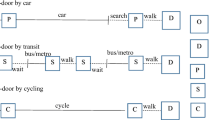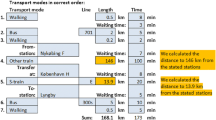Abstract
The rapid development of multimodal transportation system prompts travellers to choose multiple transportation modes, such as private vehicles or taxi, transit (subways or buses), or park-and-ride combinations for urban trips. Traffic corridor is a major scenario that supports travellers to commute from suburban residential areas to central working areas. Studying their modal choice behaviour is receiving more and more interests. On one hand, it will guide the travellers to rationally choose their most economic and beneficial mode for urban trips. On the other hand, it will help traffic operators to make more appropriate policies to enhance the share of public transit in order to alleviate the traffic congestion and produce more economic and social benefits. To analyze the travel modal choice, a generalized cost model for three typical modes is first established to evaluate each different travel alternative. Then, random utility theory (RUT) and decision field theory (DFT) are introduced to describe the decision-making process how travellers make their mode choices. Further, some important factors that may influence the modal choice behaviour are discussed as well. To test the feasibility of the proposed model, a field test in Beijing was conducted to collect the real-time data and estimate the model parameters. The improvements in the test results and analysis show new advances in the development of travel mode choice on multimodal transportation networks.
Similar content being viewed by others
References
VERPLANKEN B, AARTS H, VAN KNIPPENBERG A. Habit, information acquisition, and the process of making travel mode choices [J]. European Journal of Social Psychology, 1997, 27(5): 539–560.
van SCHIJNDEL W J, DINWOODIE J. Congestion and multimodal transport: a survey of cargo transport operators in the Netherlands [J]. Transport Policy, 2000, 7(4): 231–241.
REHRL K, BRUNTSCH S, MENTZ H J. Assisting multimodal travelers: Design and prototypical implementation of a personal travel companion [J]. IEEE Transactions on Intelligent Transportation Systems, 2007, 8(1): 31–42.
MESCHINI L, GENTILE G, PAPOLA N. A frequency based transit model for dynamic traffic assignment to multimodal networks [C]// Proceedings of 17th International Symposium on Transportation and Traffic Theory. London: Elsevier, 2007.
ZILIASKOPOULOS A, WARDELL W. An intermodal optimum path algorithm for multimodal networks with dynamic arc travel times and switching delays [J]. European Journal of Operational Research, 2000, 125(3): 486–502.
BHAT C R. A heteroscedastic extreme value model of intercity travel mode choice [J]. Transportation Research Part B: Methodological, 1995, 29(6): 471–483.
BHAT C R. Work travel mode choice and number of non-work commute stops [J]. Transportation Research Part B: Methodological, 1997, 31(1): 41–54.
QIAN Z S, ZHANG H M. Modeling multi-modal morning commute in a one-to-one corridor network [J]. Transportation Research Part C: Emerging Technologies, 2011, 19(2): 254–269.
van NES R. Design of multimodal transport networks: A hierarchical approach [M]. TU Delft, Delft University of Technology, 2002.
BANOMYONG R, BERESFORD A K C. Multimodal transport: The case of Laotian garment exporters [J]. International Journal of Physical Distribution & Logistics Management, 2001, 31(9): 663–685..
LO H K, YIP C W, WAN Q K. Modeling competitive multi-modal transit services: A nested logit approach [J]. Transportation Research Part C: Emerging Technologies, 2004, 12(3): 251–272.
MAHMASSANI H S, LIU Y H. Dynamics of commuting decision behaviour under advanced traveller information systems [J]. Transportation Research Part C: Emerging Technologies, 1999, 7(2): 91–107.
ZILIASKOPOULOS A, WARDELL W. An intermodal optimum path algorithm for multimodal networks with dynamic arc travel times and switching delays [J]. European Journal of Operational Research, 2000, 125(3): 486–502.
CASCETTA E. Transportation systems analysis: Models and applications [M]. New York: Springer, 2009.
WILSON A G, COELHO J D, MACGILL S M, WILLIAMS H C. Optimisation in locational and transport analysis [M]. New York: Wiley, 1981.
CANTARELLA G E, DE LUCA S. Multilayer feedforward networks for transportation mode choice analysis: An analysis and a comparison with random utility models [J]. Transportation Research Part C: Emerging Technologies, 2005, 13(2): 121–155.
BUSEMEYER J R, TOWNSEND J T. Decision field theory: A dynamic-cognitive approach to decision making in an uncertain environment [J]. Psychological Review, 1993, 100(3): 432–459.
WU J, SUN H, WANG D Z W, ZHANG M, HAN L, GAO Z. Bounded-rationality based day-to-day evolution model for travel behavior analysis of urban railway network [J]. Transportation Research Part C: Emerging Technologies, 2013, 31: 73–82.
ZHAO H, YAN X, GAO Z. Transportation serviceability analysis for metropolitan commuting corridors based on modal choice modelling [J]. Transportation Research Part A: Policy and Practice, 2013, 49: 270–284.
WANG R. Autos, transit and bicycles: Comparing the costs in large Chinese cities [J]. Transport policy, 2011, 18(1): 139–146.
ZHENG Y, GUO W, ZHANG Y, HU J. A generalized comfort function of subway systems based on a nested logit model [J]. Tsinghua Science and Technology, 2014, 19(3): 300–306.
MONGIN P. Expected utility theory [M]// Handbook of Economic Methodology. Cheltenham: Edward Elgar Publishing, 1997: 342–350.
QIN H, GUAN H, WU Y J. Analysis of park-and-ride decision behavior based on decision field theory [J]. Transportation Research Part F: Traffic Psychology and Behaviour, 2013, 18: 199–212.
BUSEMEYER J R, JOHNSON J G. Micro-process models of decision making [M]. Cambridge: Handbook of Computational Psychology, 2008.
ROE R M, BUSEMEYER J R, TOWNSEND J T. Multialternative decision field theory: A dynamic connectionst model of decision making [J]. Psychological Review, 2001, 108(2): 370–392.
BUSEMEYER J R, DIEDERICH A. Survey of decision field theory [J]. Mathematical Social Sciences, 2002, 43(3): 345–370.
BUSEMEYER J R, JOHNSON J G. Computational models of decision making [M]. Blackwell: Handbook of Judgment and Decision Making, 2004: 133–154.
DUAN K, LI J Y. The application of decision field theory in clothing style evaluation [J]. Journal of Donghua University: Natural Science, 2010, 36(2): 175–178. (in Chinese)
GOODMAN C J, MURATA S. Metro traffic regulation from the passenger perspective [J]. Proceedings of the Institution of Mechanical Engineers, Part F: Journal of Rail and Rapid Transit, 2001, 215(2): 137–147.
LAM T C, SMALL K A. The value of time and reliability: Measurement from a value pricing experiment [J]. Transportation Research Part E: Logistics and Transportation Review, 2001, 37(2): 231–251.
Author information
Authors and Affiliations
Corresponding author
Additional information
Foundation item: Project(2012CB725405) supported in part by National Basic Research Program of China; Project(2014BAG03B01) supported by the National Science and Technology Support Program, China; Project(71301083) supported by the National Natural Science Foundation of China; Project(20131089307) supported by the Project Supported by Tsinghua University, China
Rights and permissions
About this article
Cite this article
Guo, W., Zhang, Y., You, Jx. et al. Travel modal choice analysis for traffic corridors based on decision-theoretic approaches. J. Cent. South Univ. 23, 3028–3039 (2016). https://doi.org/10.1007/s11771-016-3366-8
Received:
Accepted:
Published:
Issue Date:
DOI: https://doi.org/10.1007/s11771-016-3366-8




